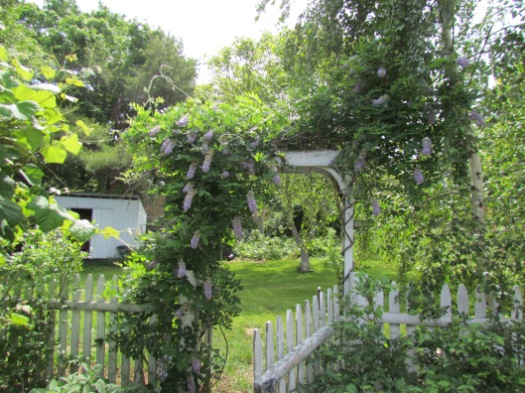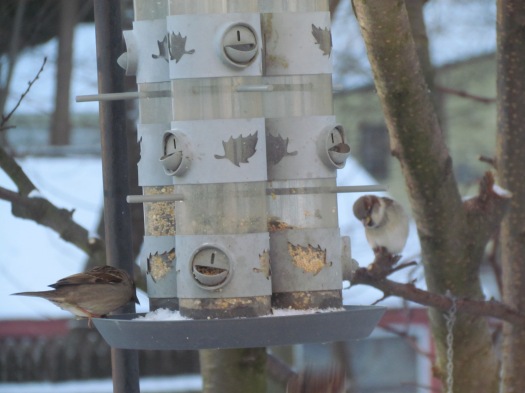There is a stack of books by my bed that keeps toppling over. Okay, 2.5 stacks. My sister has been gracious enough not to say anything, but I’m sure it’s bugging her. There’s no possible way I could read so many books at once, so why do I insist on having them haphazardly flung around my bed?

I spend a lot of my time wishing I had more time to read. If only I didn’t have to drive so much! I could be reading RIGHT NOW! The storm this weekend gave me a glorious snow day (!), so I had three days to fill with movie-watching, coffee-drinking, and book-reading (and it was impossible to go anywhere for the first day and a half, so I couldn’t throw my books aside for live friends, like I often do to the poor things). I was ecstatic. I piled books high on the coffee table, eager, unsure of which to start first.

It didn’t matter which one I chose though. Cost of Discipleship was challenging (and embarrassed me a few times, actually – more on that later), but I got tired quickly. Mary Oliver, with all her beautiful expressions of nature and its inhabitants, could not take me outside my own head, and at the end of each poem, I was unsure of where I’d gone and how I got there. Jeffrey Eugenides, no matter how hard he tried with his characters’ 20th century woes and struggles with depression, could not keep me even half-engaged. Ruth Reichl, in all her food-love and witty descriptions failed to transport me to the world of the New York Times.

I felt out of sorts, and I didn’t know why.
My book club met this week, and I was (again) the book club delinquent, arriving without having read the extremely interesting Quiet: The Power of Introverts. We had a fabulous time of birthdays and talking, but I hated that I keep not connecting with books.

Books have been my friends since I was five years old. The first book I read was Fun with Dick and Jane, an old green copy my mom and I bought at an outdoor flea market. Since that day, I’ve devoured all kinds of books, with the exception of science fiction (Sorry, K, I can hear you groaning. I tried.). From Little House to Anne of Green Gables to Betsy, Tacy, and Tib, I read all the classics. And then came the high school standards, followed by four years of collegiate-level reading that sometimes made me want to gouge my eyes out.

[This was literally the worst book I read in college. It was for an Irish Literature course, and we had to write a two-page journal response to each reading assignment. I remember sitting in the library, looking down at the quad, and realizing life was too short to read such horrid stuff.]

[We sang a setting of Thomas’s poem “Fern Hill” my senior year of college. I remember asking our conductor, “But what’s going on? What does it mean?” He looked at me and said, “Isn’t that your job, English Major?” I was sufficiently humbled. Here’s a recording of this amazing piece.]
I’ve been reading for nineteen years, but for the past few weeks, books have not spoken to me. I’ve tried. I’ve opened them gingerly, carefully, admitting them into my consciousness. I’ve focused on one book at a time, to see if that helped at all. It didn’t; I felt even more scatter-brained and self-focused while I was reading. I listened to music while I read. I turned the music off. I committed to a chapter a night. I made no commitments.

[I didn’t discover Auden until the fall of my senior year. “Stop all the clocks” and “The More Loving One” still make me cry.]
My relationship with books is cooling. Or, at least, it seems we’re on a “break.” It’s an awful thing to say about my dear friends of so long. I wonder if this feeling of distance – of complacency – is at all what a long, tired marriage feels like: you have loved deeply, but now you barely recognize your own love.

[This was for my British Lit class my junior year. I had a skinny little paperback that I riddled with sophomoric notes, and that has since been lost in the abyss that is my bedroom. I refuse to buy another copy.]
I’m hoping it will come back. That my eagerness for books and characters and interesting stories will surge up and remind me of all the wonderful things that can be learned, all the beauty that comes from reading. I’m hoping that a magic book will rest in my hands, transforming my view of the world and my place in it.

[I read all the Austen novels when I was around 15 or 16. That’s probably the perfect age to read them for the first time. I think I’m almost ready for round-two.]
Until then, I’ll keep reading. A page here and there, at first. And then a little more, and a little more. Again, I see a kinship with that long marriage – a working-at-it until it brims over with new life.
Books teach me new things every day, even when I’m not reading them.























